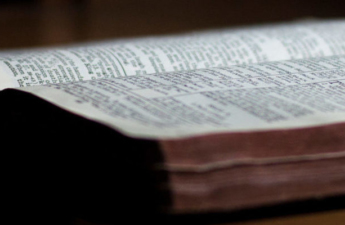As a justified man, I have not a sin against me in God’s book. If I were to turn over God’s eternal book, I should see every debt of mine receipted and cancelled.
-C.H. Spurgeon
We go to a liturgical church, which is mostly quite unfamiliar to me, but occasionally unexpectedly thought-provoking. One particular Sunday morning some weeks ago, the Confession of Sin was very compatible with the thoughts already running through my head. I don’t remember what confession it was—whether it was one from Scripture, or Calvin, or the BCP, or what—but I was really feeling it, and many of my recent failures began parading through my mind. What a disappointment I must be to God. So wretched. I just keep right on sinning, day after day. Being short with the children; impatient. Wasting time. Being “too tired” when I really could have pressed on. Getting snippy with Seth over dinner. Eating too much chocolate.
I prayed. Oh, God, forgive me.
Then the pastor read the Assurance of Pardon, which that morning was from Psalm 103 (ESV):
The LORD is merciful and gracious,
slow to anger and abounding in steadfast love.
He will not always chide,
nor will he keep his anger forever.
He does not deal with us according to our sins,
nor repay us according to our iniquities.
For as high as the heavens are above the earth,
so great is his steadfast love toward those who fear him;
as far as the east is from the west,
so far does he remove our transgressions from us.
As a father shows compassion to his children,
so the LORD shows compassion to those who fear him.
For he knows our frame;
he remembers that we are dust.
That morning, sitting there in church, bouncing a baby on my knee—the Spirit worked and the words shattered straight to the heart of me.
Justified.
I realized that I’ve mostly thought about God saving me from my sins as a past-tense (at the cross) and a future-tense (letting me into heaven) kind of way. “You were washed, you were sanctified, you were justified in the name of the Lord Jesus Christ,” Paul says (1 Corinthians 6:11). And we are “justified by his grace [so that] we might become heirs according to the hope of eternal life” (Titus 3:7). “Since therefore we have now been justified by his blood…” (Romans 5:9). These verses, this sense of justification is what I’ve had catechized deep into my mind.
And, indeed, our justification is by Christ’s blood, and is eternal, and is something which comes with salvation.
But I was missing something—the present reality of God’s forgiveness.
One day as I was passing into the field, and that too with some dashes on my conscience, fearing lest yet all was not right, suddenly this sentence fell upon my soul. Thy righteousness is in heaven. And methought, withal, I saw with the eyes of my soul Jesus Christ at God’s right hand; there, I say, was my righteousness; so that wherever I was, or whatever I was a-doing, God could not say of me, he wants my righteousness, for that was just before him. I also saw, moreover, that it was not my good frame of heart that made my righteousness better, nor yet my bad frame that made my righteousness worse, for my righteousness was Jesus Christ himself…
-John Bunyan
Paul writes in Romans 5:1 that because of our justification by faith, we have peace with God. 1 John 1:9 adds that “if we confess our sins, he is faithful and just to forgive us our sins and to cleanse us from all unrighteousness.” 1 John 2:1, “if anyone does sin, we have an advocate with the Father, Jesus Christ the righteous.” Romans 8:1, “There is therefore now no condemnation for those who are in Christ Jesus.” Romans 8:39, “For I am convinced that neither death, nor life, nor angels, nor principalities, nor things present, nor things to come, nor powers, nor height, nor depth, nor any other created thing, will be able to separate us from the love of God, which is in Christ Jesus our Lord.”
Forgiven.
I knew those verses before that Sunday morning; I knew Psalm 103. Yet sitting there, my sins fresh on my mind and the overwhelming guilt weighing so heavy on my shoulders—reading those amazing, precious words: “He does not deal with us according to our sins.” I am sure I stopped breathing. But the goodness kept on flowing. “Nor repay us according to our iniquities.” “As far as the east is from the west, so far does he remove our transgressions from us.”
The next line left me really gobsmacked: “as a father shows compassion to his children, so the Lord shows compassion to those who fear him.” Oh, what metaphor I know! How gracious of God to give us these little word pictures, to give us parenthood so we have an inkling of how He feels toward us. So many times a day I am called to rebuke our children. So many, many times that children sin. So many times they hurt me, even, with angry words or even (on the part of the toddlers!) an angry thwack.
And yet it is completely unthinkable to suggest that I might stop loving them because of these things! When they repent, I think I love them even more than I did before, not less—it is such a joy to see. And when I see their continuing sorrow for what they did, I want to fix it, to make them feel better, to let them know that it’s forgiven and that they are still my very own dear little ones and that I am not angry.
“For he knows our frame; he remembers that we are dust.” Just as a parent knows that their children are children, God knows our weakness. Which is not an excuse, any more than “he’s just a kid!” is an excuse for childish behavior, but it is a comfort. Ecclesiastes 7:20, “Surely there is not a righteous man on earth who does good and never sins.” God knows my sin—my sin this very day!—and yet sent His Son to atone for it. While we were yet sinners, Christ died for us! While we were dead in our trespasses and sins! And if we confess our sins, He is faithful and just to forgive us. Even as I was worried and weighed down by my sin that Sunday morning, God was faithfully forgiving and removing and washing it away, listening to me with loving ears, and somehow seeing not my sin, but His Son’s righteousness.
He does not deal with us according to our sins.
Who can bring an accusation against God’s elect?
God is the One who justifies.
Who is the one who condemns?
Christ Jesus is the One who died,
but even more, has been raised;
He also is at the right hand of God
and intercedes for us.
Romans 8:33-34 (HCSB)




